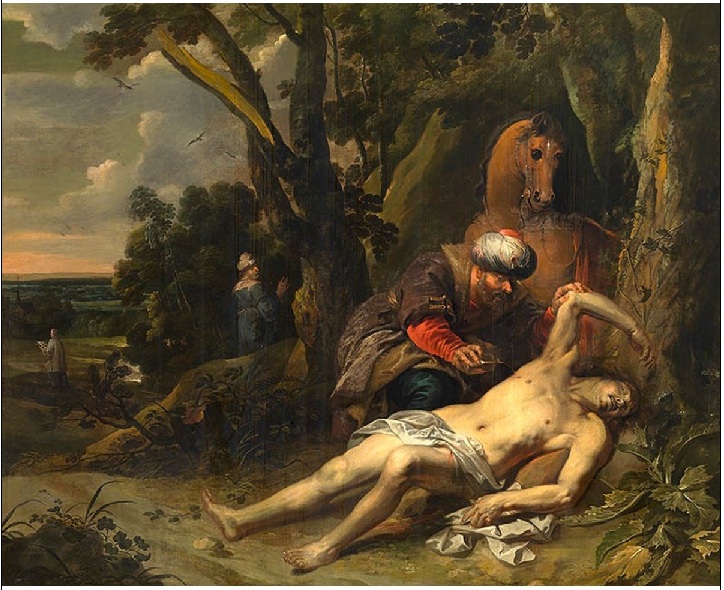In an op-ed for the Tampa Bay Times, the Reverend Mary Anne Dorner reflects on the current healthcare debate in the light of the parable of the “good Samaritan.” After setting out the story, she reports,
Recently when I turned on the news, there was President Donald Trump saying: “Let Obamacare fail.” The commentators went on to say Trump had “the tools” to make this happen. He could order the government to hold back reimbursement funds to insurance companies for those who get subsidies under the Affordable Care Act. Congress could also repeal without replacing the ACA — something Trump promised not to do when campaigning for president.
In the news clip that I saw, Trump laughed and said that the GOP-run Congress could just stand back and watch the health care system fail and then “everyone will (have) to come to us.”
I found those words chilling. How can this be our president’s solution to the health care crisis? Is he really advocating that our elected officials destroy or cripple our current health care system? Doesn’t he care about the millions of people who will be left lying on the side of the road as we pass them by?
Dorner’s granddaughter relies on Medicaid, one among millions, Dorner says, who could lose out if the ACA is repealed and Medicaid cut.
… What happens this week in Congress could decide the fate of generations to come. We cannot afford to be bystanders. We can decide which part to play in the Good Samaritan story.
Will you be like the priest or Levite who passed on by? Or will you stop and take action to make sure that all citizens have access to affordable health care?
If you identify with the Good Samaritan, then it is time to speak up, protest, write letters, send faxes and pressure Congress to improve our health care system, not destroy it. Millions are counting on you to take action today.
The Reverend C Eric Funston makes the argument in a parish newsletter posted on his blog, That Which We Have Heard and Known.
What do orange-haired casino owners, former First Ladies, Muslim refugee children, police officers, unborn babies, doctors and nurses who perform abortions, progressive hipsters, conservative Republicans, prosperity-gospel televangelists, members of Congress, transgender former athletes, Confederate-flag-waving white nationalists, Black Lives Matter activists, middle-of-the-road Democrats, and aging clergy all have in common?
Together with you and everyone else on earth, they are sacred.
Via personal experience, the Declaration of Independence, and religious, political, and philosophical thinkers, Funston also makes his way to the parable of the “good Samaritan,” and the Christian call to action.
Roman Catholic writer Mark Shea argues from the parable of the Good Samaritan that provision of health care to those in need is not a matter of charity, but a matter of justice:
A child does not have a right to life because of charity. His parents are not doing him a favor by not driving him out to the woods and leaving him there. They are doing him justice, because justice pertains to what is owed. A child is owed his life by his parents by virtue of being human.
The same is true of any human being in danger. The wounded man in the parable was owed his life, and the priest and Levite robbed him by ignoring him. Meanwhile, the Samaritan was not, according to Jesus, a hero or a saint, but merely a neighbor. The priest and Levite sinned by depriving the man of simple justice. The Samaritan bestowed not charity, but simple justice by giving him what we today call “health care.” (Our Sunday Visitor, May 31, 2017)
There are a lot of arguments about health and health care being made (and they have been made again and again) from legal, financial, economic, and political points of view, but they all seem to eventually come back to the notion that health is a commodity and that health care is something to be bargained for in the marketplace. What if we were to change that conception? What if, as those who believe that human life is sacred, as those who believe that human beings are inherently due respect and dignity, as those who believe in healing as a matter of justice, we Christians were to suggest an alternative point of view? What if we were to suggest that health is not a commodity but a human right? Could we change the tenor of the discussion? Could we find a way through the impasse about health care and our medical services delivery system?
I don’t know. But I do know, from personal experience getting ready for surgery and from personal experience aging into the Medicare system, that the president was right about this thing! “It’s an unbelievably complex subject.” It’s a legal, financial, political, and – for us as Christians – religious subject. We need to speak up and insist that that religious, philosophical dimension be addressed in the public debate.
Read more of Dorner’s op-ed here, and of Funston’s article here. How are you applying the Christian ethic to the current healthcare debate?
Featured image: The Good Samaritan, Balthasar van Cortbemde [Public domain or Public domain], via Wikimedia Commons

